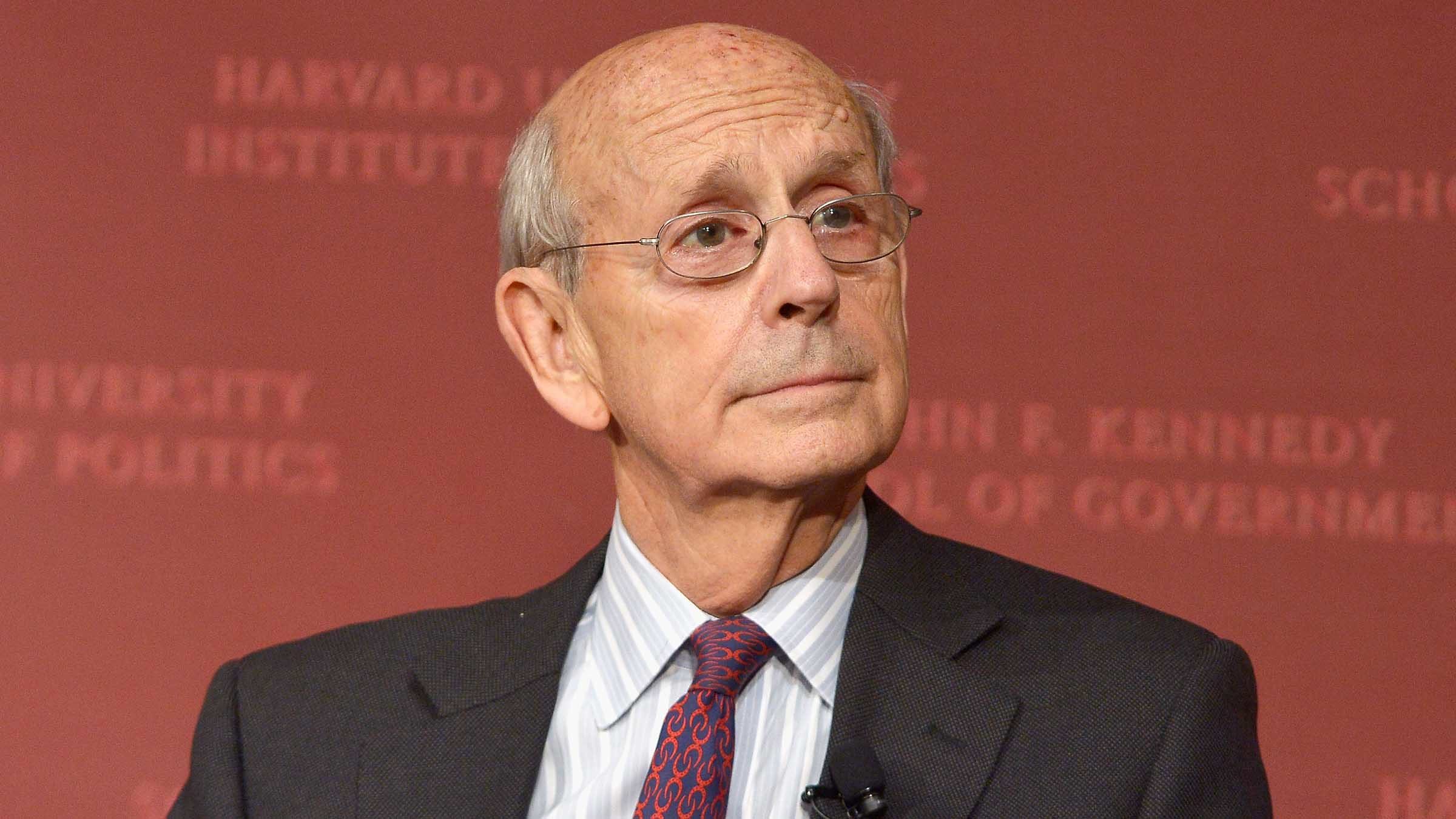Stephen Gerald Breyer celebrated his 83rd birthday on August 15, some two months after wrapping his 27th year on the United States Supreme Court. The eldest sitting justice by a ten-year margin, Breyer also became the senior statesman of the Court’s shrinking liberal wing after the death of Justice Ruth Bader Ginsburg last September at age 87. With Justice Amy Coney Barrett serving as her replacement, Breyer’s influence is now limited to occasional protests in irrelevant dissents, as this 6-3 conservative supermajority steamrolls any and every progressive priority that makes its way before them.
If you are a normal person with a functioning brain, you probably look at the Democratic Party’s precarious hold on power in Washington and think, “Gee, Breyer should retire as soon as possible, yeah?” In an evenly-divided Senate, the death of a single Democrat could bring the Biden administration’s confirmation efforts to a grinding halt. Should Republicans win the upper chamber in 2022—according to betting markets, a toss-up at best—Biden might be unable to confirm anyone to the Court during his time in office. Given that liberal judicial power is already at its lowest point since the Great Depression, the ramifications of opening the door to a future Republican president replacing Breyer with another fifty-something Federalist Society automaton are too dire to bet on one octogenarian’s continued good health.
If you are a tenured law professor or well-compensated Supreme Court watcher, however, none of these blindingly obvious realities matter quite as much as some combination of Breyer’s exuberance for his work and the fragility of his feelings. “Friends, Romans, countrymen, law professors: Please stop telling Justice Stephen Breyer to retire,” pleaded Harvard Law School professor and noted Barrett enthusiast Noah Feldman. “The more the timing of his retirement is depicted as a partisan objective, the less he will want to do it,” he said, apparently confusing a sitting Supreme Court justice for a three-year-old ignoring pleas to put on pants before company shows up for dinner.
Feldman’s salutation refers to the multitude of journalists, authors, editorial boards, columnists, activist groups, members of Congress, and, yes, law professors who began calling for Breyer’s retirement basically the moment Biden took office. (Demand Justice, which sponsors Balls & Strikes, is one of many voices in this chorus.) But to date, Breyer has resisted these overtures, worrying that the appearance of a politically strategic retirement would plunge the Court into a full-blown legitimacy crisis. Earlier this month, he released an entire book premised on the notion that judges are not “politicians in robes,” which I can only conclude is an elaborate practical joke designed to make me walk into the mouth of an active volcano.
A speech he delivered in May offered another glimpse of Breyer’s alarmingly West Wing-fanfiction-esque view of the state of national politics. In it, he offered a sage bit of advice to Democratic lawmakers confounded by their Republican counterparts’ efforts to, for example, preserve the right of every American to die from COVID-19 because a maskless, unvaccinated stranger sneezed on them in the produce aisle. “If you need Republican support, talk to them,” Breyer chided, raising the obvious question of whether he, personally, has talked to a Republican at any point in the last four decades. “‘My friend, what do you think?’ Get them talking and they’ll eventually say something you agree with.”

The crux of Feldman’s argument is a bit of armchair reverse psychology: Because Breyer professes not to believe that courts are “political,” pressuring him to retire for political reasons might prompt him to remain on the bench even longer, just to make a point. In any event, Feldman argues, liberals needn’t wring their hands so much in the first place: As “one of the great pragmatist justices ever to have sat on the Supreme Court,” Feldman asserts, Breyer “can be trusted to do the right thing.” The commentariat, he concludes, “should stand back and let the master operate.”
Others have offered similar defenses of Breyer’s discursive musings about the wisdom of stepping down. “The more we politicize the court and its work, the more judges and justices must perform their own neutrality,” writes Dahlia Lithwick in Slate. “This isn’t just ego or narcissism; it is exactly the kind of institutionalism Breyer has expressed over and over throughout his career.” In The Daily Beast, Jay Michaelson argues that Breyer should call it quits in 2022, not 2021, dismissing calls for him to retire earlier as “premature” and “demeaning.” “He has earned the respect of his colleagues during his 27 years on the court,” Michaelson says. “He deserves better than to be shown the door.” Also in Slate, Georgetown University Law Center dean William Treanor points out that Breyer might not actually die soon, so why all the fuss? (He also notes that Breyer maintains “a good exercise regime,” because if recent history has taught us anything, it’s that faith in an elderly liberal justice’s much-ballyhooed commitment to fitness is always well-placed.)
What these analyses miss is that people who “politicize” the Court are simply responding to the reality that the Court is a politicized institution, and that its life-tenured members are not exactly shy about exercising their power as they see fit. On a Court that includes Justices Neil Gorsuch and Barrett instead of Justices Merrick Garland and Hypothetical January 2021 Biden Nominee X, the distinction between “ego and narcissism” and “institutionalism” is meaningless. Already, Ginsburg’s choice not to retire under a Democratic president has enabled the Court to eviscerate the right to abortion care that she spent so much of her life defending. When Breyer’s nostalgia for cooperation and compromise is a delusion that entails such devastating real-world consequences, using it as the basis for a decision this important can only be ascribed to some combination of his arrogance and naïveté.
Part of the Feldman/Lithwick/Treanor critique is a practical, outcome-driven point: that even if you set aside the propriety of calling on Breyer to retire, actually doing so might be a misguided, counterproductive strategy. But that framework implicitly shifts the blame for Stephen Breyer’s intransigence from the person who holds power, Stephen Breyer, to the millions of people whose only plea is that he exercise it responsibly. Taken to its logical conclusion, this view would use his willful blindness as a perpetual shield against well-placed criticism. Giving him the kid-gloves treatment here is like deciding not to warn a stubborn homeowner about the tornado bearing down on them because they do not believe wind exists.
If Stephen Breyer is really less likely to retire because he doesn’t like being told what to do or how to think, that’s a profound failure of responsibility.
The Breyer Apologia Industrial Complex also tidily illustrates the brand of elitist gatekeeping that pervades legal punditry. In a separate interview with The New Yorker’s Isaac Chotiner, a puzzled Feldman seemed more offended by the impolitely public nature of calls for Breyer’s retirement than by their substance. “I would think that if someone really wanted a Justice to retire, the logical way to do that would be to communicate that privately to the Justice,” Feldman reasoned. “I think it has been a little odd when people for whom I have a lot of respect—important scholars and academics or public figures—think that the best way to convince a Justice to retire is to write an open letter.” In other words, if you want Stephen Breyer to quit, fine, but at least have the courtesy to call his chambers, make an appointment, and tell him over lunch at the University Club.
This is as wrong as it is wildly out of touch. Publicly criticizing politicians’ bad decisions is a cherished American tradition, and judges are not exempt just because they wear robes instead of suits. For people who are not Ivy League law professors with Stephen Breyer on speed-dial, there is literally nothing else they can do to hasten his retirement. He is not term-limited, he faces no mandatory retirement age, and he cannot be voted out of office. You do not need to rack up six figures’ worth of law school debt to understand that by taking the bench for a 28th year this fall, Breyer is placing two gigantic bets—one on his health, and the other on his replacement one day occurring under optimal conditions. If you think bedrock values like the right to choose and marriage equality and affirmative action and voting rights are too important to gamble with here, yelling at him to get his shit together before a 7-2 conservative super-supermajority comes to pass is your last, best hope.
Much of the coverage of Breyer’s choice, for what it’s worth, amounts to amateur tea-leaf reading. It’s not clear how much of this speculation about the precise state of his headspace is accurate, and how much of it is pundits projecting their reverence for the institution on an 83-year-old lawyer who speaks mostly in pleasant-sounding vagaries.
But if Stephen Breyer is really less likely to retire at this critical juncture in the Court’s history because he doesn’t like being told what to do or how to think, that’s a profound failure of responsibility, and it deserves to be called out loudly and unapologetically. The choices Breyer is making right now could pave the way for an even-more-emboldened reactionary Court to roll back decades of social progress, hollow out hard-earned civil and human rights, and further entrench minoritarian rule in this country. Scolding people for having the temerity to say so is tantamount to telling them to just watch it happen in silence.

